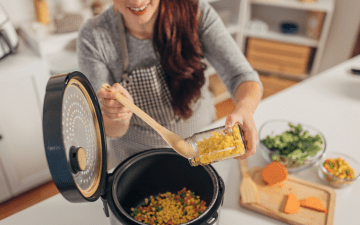Easy Ways to Keep Up With Food Recalls

On average, more than 600 food and beverage recalls are issued in the U.S. annually. Learn how to stay informed and what to do if your food is recalled.
Foodborne illnesses can occur if you don’t properly store and prepare your food after bringing it home from the grocery store. Perishable foods that are not cooked sufficiently, or left out on the counter too long, can become contaminated with bacteria and other pathogens. If you eat contaminated food, you may experience diarrhea, nausea and vomiting, fever, and stomach pain.
Symptoms of foodborne illnesses (also known as food poisoning) can last for several days, and in more serious cases, may require hospital treatment. Foodborne illnesses can be fatal, with more than 3,000 people in the U.S. dying from consuming contaminated food each year.
Improper procedures for growing, processing, or shipping food can also cause foodborne illnesses. For example, recent outbreaks have been linked to cucumbers contaminated with salmonella and deli meats tainted with listeria.
Manufacturers and growers often send out recall notices voluntarily when they discover problems with their products. Two federal government agencies also inspect food before it’s sold to consumers and can require recalls:
- The U.S. Department of Agriculture (USDA) issues recall notices for meat, poultry, and eggs that are unsafe.
- The U.S. Food and Drug Administration (FDA) issues recalls on food and beverages that have potential risks for consumers, such as contamination with disease-causing organisms, the presence of foreign objects like glass and metal, or failure to list an allergen.
The Centers for Disease Control and Prevention also plays a role in coordinating the federal government’s response to foodborne illness outbreaks.
Tips For Staying Informed
On average, more than 600 food and beverage recalls are issued in the U.S. annually. Keeping up with so many food recalls can be challenging, but it’s necessary to protect yourself and your family. Knowing about potential problems with the food and beverages in your kitchen—before you eat or drink them—can prevent serious illnesses.
Staying informed about food recalls is especially important if you or a family member has food allergies or is at greater risk of getting foodborne illnesses. This includes older adults, children under age six, pregnant and lactating women, and people with compromised immune systems.
To make staying informed about food recalls less of a headache, we offer these tips:
- Check recall listings on government websites. The USDA and FDA maintain listings of current recall notices on their websites. Those notices are also consolidated on the foodsafety.gov website.
- Sign up for email alerts. The USDA and the FDA both offer email notifications of food recalls which you can sign up for.
- Follow on social media. On X/Twitter, you can get recall notifications in your feed. Follow @FDArecalls and @USDAFoodSafety.
- Get an app. There are several phone and tablet apps available that can alert you to food recalls through push notifications. Some allow you to filter recall notices by states affected or by severity of the outbreak.
- Ask how your grocery store alerts customers to recalls. Stop by the customer service desk in the grocery store where you shop and ask how the store notifies its customers of food recalls. For example, can you sign up for text message or email alerts? If they offer such services, sign up.
- Check store websites. If your grocery store doesn’t send out alerts, get in the habit of checking their website for recall notices. Hannaford, Price Chopper, and Shaw’s all have dedicated recall pages on their websites that you can bookmark.
- Consider buying local. Although Vermont growers and food producers aren’t immune to food recalls, they tend to be smaller scale and may be less prone to making errors that can contaminate foods. Consider buying your produce, meats, and eggs from local sources, such as through farmers’ markets or food co-op stores.
What To Do If Your Food Is Recalled
If you see a recall notice that may affect you, be sure to read the notification carefully and follow any instructions given. If the recall is limited to certain lot numbers or production dates, check your food to see if it’s among the packages that are being recalled.
If you have food that has been recalled:
- Don’t cook or serve it. Remove it from your kitchen immediately to prevent accidental consumption.
- Recalled food can often be returned to the store where it was purchased for a refund.
- If a refund isn’t offered, be sure to dispose of the food properly. Wrap contaminated food in plastic before placing it in the trash.
- Wash your hands thoroughly after handling recalled food that may be contaminated.
- Sanitize any surface, cookware, or container that the contaminated food was in contact with.
- Don’t give recalled food to other people or donate it to an organization like a food bank.
- Don’t feed recalled food to your pets or other animals.
Stay Informed and Safe
We hope you’ll never get a foodborne illness, which can be painful and even life-threatening. One of the best ways to prevent foodborne illnesses is to stay informed about food recall notices. Using the tips in this article, you’ll know when the food in your refrigerator or pantry has been recalled and can quickly take action to stay safe.



